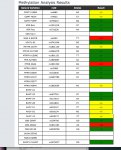The Yasko camp suggests these for glutamate balance:
L Theanine but if not COMT +\+
GABA
Lithium orotate which also helps with B12
Magnesium
Branched chain amino acids
& zinc but under 30-35 mg or so
There are many others too but keep in mind that those who don't do well on mag, don't seem to do well on zinc either.
I'd also really avoid heavy glutamates in the diet which are red meats & pretty much all processed foods
Good luck!
angela
I must have a glutamate imbalance, because my brain is whacked out and my sleep is shot lately. At least that must be part of it.
I have 2 of the COMTs +- (see below). I've found that theanine sort of helps to calm my brain, and I can take fairly large amounts before I feel it. Tryptophan used to work very well (for sleep), but right now it's not. GABA, on the other hand, causes *severe* anxiety, even at just 100 mg. Very weird how that is.

Lithium arginate doesn't seem to phase me, though I haven't tried the orotate kind. Magnesium is my friend that I cannot live without. Same with potassium. ZInc makes me very wired.
I eat red meat every day and need it. I also eat a lot of vegies and almost no grains or dairy, which can be a problem.
Interesting what you said about BANANAS. Going thru my severe insomnia right, I am craving bananas and need to eat at least one every day.



